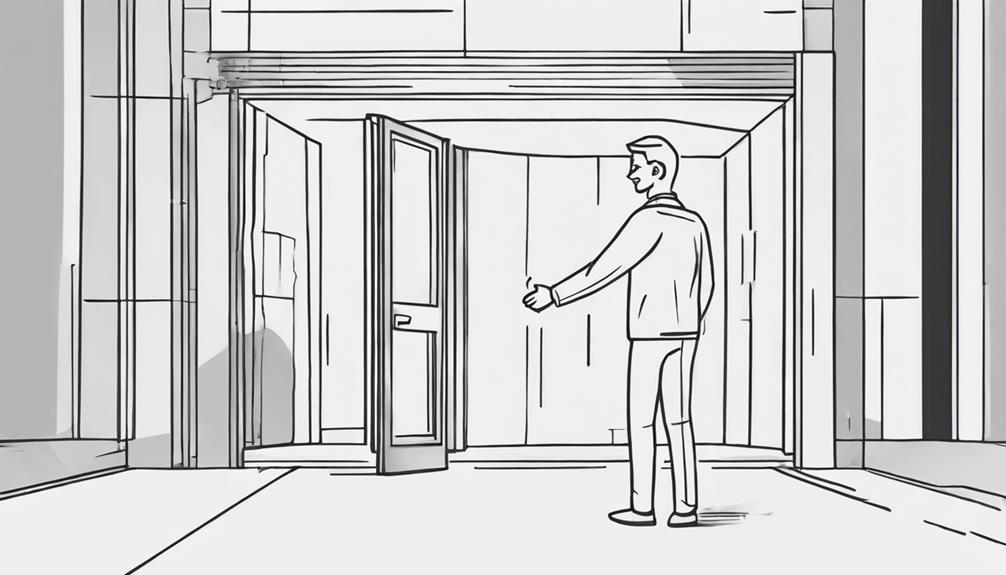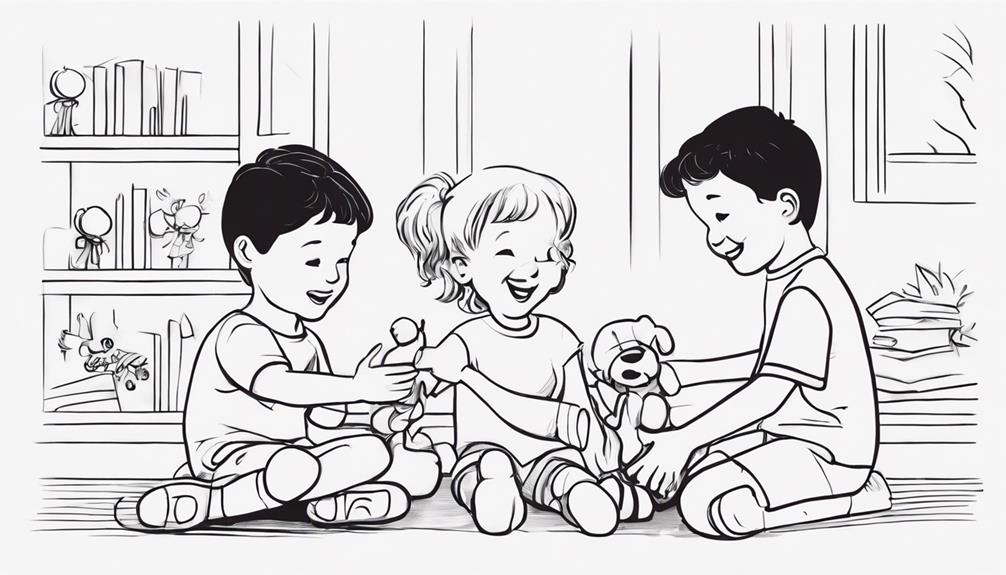The importance of manners transcends mere social niceties; it serves as a fundamental component of human interaction. Manners provide a framework for navigating the complexities of social dynamics, establishing a code of conduct that reflects one's values and consideration for others. Beyond surface-level politeness, manners delve into the core of human relationships, influencing how we perceive and are perceived by those around us. But why exactly are manners important beyond the superficial facade of etiquette? Let's explore the deeper implications of this seemingly simple yet profound aspect of human behavior.
Key Takeaways
- Manners foster respect and consideration, shaping positive relationships.
- Good manners enhance trust, communication, and professional success.
- They contribute to a sense of well-being, promoting empathy and harmony.
- Upholding social etiquette standards builds unity, respect, and peaceful coexistence.
Importance of Good Manners

Demonstrating good manners serves as a foundational element in fostering respect and consideration within social interactions. Good manners are essential in showcasing respect for others, as they entail behaviors that acknowledge the feelings, thoughts, and boundaries of those around us. The concept of good manners aligns with the golden rule, emphasizing the importance of treating others as we would like to be treated ourselves. By understanding and respecting others' experiences, needs, and boundaries, individuals can create a more harmonious and respectful social environment.
Research indicates that humans have an innate sense of fairness, which underlines the significance of good manners in promoting equity and respect in interactions. From simple acts of politeness to more significant gestures that contribute to building positive relationships, good manners play a crucial role in shaping social dynamics. By practicing good manners and demonstrating respect for others, individuals can cultivate stronger connections, foster understanding, and contribute to a more respectful and considerate society.
Building Positive Impressions
The influence of good manners on individuals' ability to build positive impressions is a crucial element in shaping social interactions and relationships. Demonstrating good manners creates positive first impressions, influencing how others perceive and interact with us. It reflects respect, consideration, and thoughtfulness towards others. Building positive impressions through manners fosters stronger relationships and more meaningful connections. Manners also play a significant role in shaping our reputation and how others perceive our character and upbringing in various social and professional settings.
| Importance of Good Manners |
|---|
| Creates positive first impressions |
| Reflects respect and consideration |
| Fosters stronger relationships |
| Shapes reputation and character |
| Evident in social and professional settings |
Enhancing Interpersonal Relationships

Enhancing interpersonal relationships is a fundamental aspect of human interaction that contributes significantly to personal and professional growth. Effective communication and interactions are essential building blocks for establishing strong connections with others. Here are five key points highlighting the importance of manners in enhancing interpersonal relationships:
- Trust and Communication: Good manners enhance trust and facilitate clear communication in both personal and professional relationships.
- Positive Environment: Demonstrating courtesy and respect creates a positive and harmonious environment for interactions to thrive.
- Foundation for Connections: Manners serve as a foundation for building meaningful connections that lead to successful outcomes in relationships.
- Rapport and Understanding: Respectful behavior fosters rapport and mutual understanding between individuals, fostering stronger relationships.
- Empathy and Consideration: Upholding good manners showcases empathy and consideration, which are crucial in strengthening the bond between people.
Impact on Professional Success
The impact of good manners on professional success is a critical aspect of career development. Career etiquette benefits individuals by fostering positive interactions in the workplace and positioning them for networking advantages. Understanding the significance of good manners in professional settings is pivotal for establishing credibility, building relationships, and advancing one's career trajectory.
Career Etiquette Benefits
Demonstrating adept career etiquette practices significantly contributes to fostering a conducive professional environment conducive to success and growth.
- Career etiquette enhances professional reputation and credibility.
- Good manners in the workplace promote a positive work culture and teamwork.
- Demonstrating proper etiquette in business settings can lead to career advancement opportunities.
- Effective communication through manners improves client relationships and networking.
- Adhering to workplace etiquette standards reflects professionalism and reliability.
Networking Advantage
Networking efficiently leverages professional relationships to propel one's career trajectory towards success and growth. Social etiquette plays a crucial role in establishing and nurturing these connections, leading to various advantages in the professional realm. By adhering to good manners, individuals can leave a positive impression, making them more memorable and likely to be recommended for opportunities. Furthermore, demonstrating respect and etiquette in networking enhances one's credibility and trustworthiness, paving the way for fruitful collaborations and partnerships. The table below summarizes the key benefits of incorporating social etiquette into networking:
| Benefits | Description |
|---|---|
| Increased Opportunities | Good manners in networking can lead to more chances for career advancement. |
| Enhanced Credibility and Trust | Demonstrating respect and etiquette can boost credibility and trustworthiness. |
| Improved Professional Relationships | Building strong connections through good manners can open doors to new partnerships. |
Cultivating Empathy and Respect

Cultivating empathy and respect through the practice of good manners is essential for fostering understanding and compassion among individuals. These virtues form the foundation of harmonious relationships and contribute to a more compassionate and inclusive society. Here are five key points highlighting the significance of cultivating empathy and respect through good manners:
- Enhances understanding and compassion for others.
- Fosters positive relationships and creates a harmonious environment.
- Teaches individuals to consider and value the feelings of others.
- Fundamental elements of good manners that promote unity and connection.
- Key to building a compassionate and inclusive society.
Creating a Positive Environment
Through the practice of good manners, individuals can significantly contribute to fostering a positive environment for social interactions. Good manners play a crucial role in creating a welcoming atmosphere where people feel respected, valued, and appreciated. Following etiquette guidelines not only enhances individual interactions but also promotes harmony and mutual respect among people. By demonstrating good manners, individuals can experience smoother communication and more pleasant social exchanges, leading to improved relationships and a sense of well-being. Upholding proper manners is essential for cultivating positivity and establishing a conducive environment for meaningful connections.
| Benefits of Good Manners |
|---|
| Creates a positive environment |
| Makes people feel respected, valued, and appreciated |
| Fosters harmony and mutual respect |
| Leads to smoother communication |
| Contributes to a sense of well-being |
Demonstrating Social Awareness

Demonstrating social awareness through the practice of good manners involves a conscious consideration of others' emotions and boundaries. This awareness is crucial in fostering positive interactions and relationships in both personal and professional spheres. Here are some key points to highlight the importance of manners in demonstrating social awareness:
- Respecting Others: Good manners show respect for the feelings and rights of others.
- Consideration of Impact: Being socially aware means understanding how your words and actions can affect those around you.
- Understanding Social Norms: Manners reflect an understanding of social cues and norms, leading to smoother social interactions.
- Encouraging Empathy: Social awareness encourages empathy towards diverse perspectives and backgrounds.
- Promoting Harmony: Practicing good manners contributes to creating a more inclusive and respectful society, where individuals feel valued and understood.
Boosting Self-Confidence
Practicing good manners is instrumental in bolstering self-confidence through the reflection of self-respect and consideration for others. Teaching good manners to kids is crucial as it provides them with a framework for navigating social interactions with confidence. By instilling these values early on, children learn to respect themselves and those around them, leading to a positive self-image. Consistently displaying good manners helps children feel more at ease in various social settings, fostering a sense of security and assurance in their abilities to interact with others.
| Benefits of Good Manners for Kids |
|---|
| Enhances self-assurance |
| Fosters respect for oneself |
| Promotes positive self-esteem |
Cultivating good manners from a young age equips children with the tools to navigate social situations confidently, allowing them to interact with others respectfully and assertively. This foundation of good manners contributes to a positive self-perception, reinforcing feelings of self-worth and confidence in children as they grow and mature.
Upholding Social Etiquette Standards

Upholding social etiquette standards is paramount for fostering respectful and harmonious interactions within society, setting a foundation for positive social norms and community cohesion. Proper manners play a crucial role in shaping social dynamics and promoting a conducive environment for interactions. Here are five key reasons why upholding social etiquette standards is essential:
- Social etiquette standards set guidelines for respectful and harmonious interactions in society.
- Upholding manners showcases consideration for others and promotes positive social norms.
- Following etiquette standards fosters a sense of community and unity among diverse individuals.
- Good manners serve as a universal language of respect and understanding in social settings.
- Adhering to social etiquette standards demonstrates mindfulness and empathy towards others.
Promoting Harmony in Society
Promoting harmony in society through the cultivation of good manners is crucial for establishing a cohesive social fabric. By emphasizing respect and consideration, individuals can contribute to a more peaceful and understanding community. This foundation of mutual respect is essential for reducing conflicts and fostering positive relationships among diverse groups.
Building Social Cohesion
Fostering respect and empathy through the cultivation of good manners plays a pivotal role in building social cohesion and promoting harmony in diverse societies. Good manners are essential in creating a positive social environment that values inclusivity and cooperation. Here are five key points highlighting the significance of manners in promoting social cohesion:
- Good manners serve as a unifying factor that bridges differences.
- Demonstrating proper etiquette helps build harmonious relationships within society.
- Upholding respect and empathy encourages solidarity and understanding.
- Manners contribute to a peaceful and inclusive social atmosphere.
- Being a role model for good manners can inspire others to follow suit, fostering a sense of community and togetherness.
Fostering Mutual Respect
The cultivation of mutual respect in society is a foundational pillar for fostering harmonious relationships and promoting social cohesion. Demonstrating good manners plays a crucial role in fostering mutual respect among individuals, leading to a more inclusive and welcoming society. By considering others' feelings and perspectives, individuals can create an environment of understanding and cooperation. Some argue that good manners are essential for reducing conflicts and building trust among people from diverse backgrounds. Upholding respectful behavior based on good manners not only enhances positive interactions but also contributes to a cohesive community where individuals value each other's differences. The table below highlights the key aspects of fostering mutual respect through good manners:
| Aspects of Fostering Mutual Respect |
|---|
| Encourages consideration for others |
| Reduces conflicts in diverse environments |
| Creates a welcoming and inclusive atmosphere |
Good Manners in the Digital Age

In the era of digital communication, the observance of good manners is paramount for fostering positive online interactions and relationships.
- Manners in the digital age encompass online etiquette and respectful communication.
- Good digital manners include being mindful of tone, language, and privacy.
- Online manners promote a positive online environment and prevent misunderstandings.
- Practicing good manners online builds credibility and trust in virtual interactions.
- Digital manners are crucial for effective communication and building strong online relationships.
Maintaining good manners in the digital realm is essential for creating a harmonious online environment. By adhering to online etiquette, individuals can cultivate respectful and meaningful interactions. Being conscious of one's tone and language when communicating online is vital to avoid inadvertently causing offense or misunderstanding. Respecting privacy boundaries in the digital space demonstrates consideration for others' personal information. Upholding good digital manners not only enhances credibility and trust in virtual exchanges but also plays a pivotal role in nurturing enduring online connections.
Teaching Manners to Future Generations
Educating children about manners is essential as it cultivates respect, empathy, and consideration from an early age. The foundation of successful relationships and interactions in the future heavily relies on the manners instilled during childhood. Teaching good manners to future generations not only promotes positive behavior but also ensures societal cohesion and the continuity of civil values.
Importance of Politeness
Instilling the principles of politeness in young individuals is a foundational step towards fostering respect, empathy, and effective social interactions from an early age.
- Politeness helps children navigate social situations with confidence and consideration for others.
- Good manners in children lead to positive interactions, friendships, and a sense of community.
- Learning politeness early on contributes to the development of well-rounded and socially adept individuals.
- Instilling good manners in kids prepares them for success in personal and professional relationships.
- Teaching manners to future generations instills respect, empathy, and social skills, enabling them to interact with people in a manner that is considerate and understanding.
Role of Etiquette
Teaching etiquette to younger generations serves as a pivotal foundation for fostering respect, empathy, and harmonious social interactions within society. Instilling good manners in children is crucial as it cultivates essential life skills necessary for effective communication and building relationships. By passing down good manners to the youth, a positive and harmonious community is created, where individuals treat each other with kindness and consideration. Role modeling proper etiquette is key in setting a strong foundation for future generations to emulate. The practice of instilling manners in youth not only shapes their behavior but also contributes to the development of a culture where respect and empathy are valued, ultimately leading to a more cohesive and understanding society.
Impact on Society
The cultivation of manners in younger generations plays a fundamental role in shaping societal norms and fostering a culture of respect and empathy within communities. Teaching good manners to future generations has several significant impacts:
- Fosters a culture of respect and consideration in society.
- Instills empathy and kindness in children, shaping their interactions with others positively.
- Helps children understand the importance of treating others with respect and dignity.
- Contributes to building strong and harmonious relationships.
- Lays the foundation for a more courteous and empathetic society.
Frequently Asked Questions
Why Manners Are Important in Our Life?
Manners at work play a pivotal role in fostering a positive, respectful, and productive environment. They contribute to effective communication, conflict resolution, and team cohesion. Displaying good manners at work demonstrates professionalism, empathy, and social skills, enhancing relationships with colleagues, superiors, and clients. Moreover, proper workplace etiquette influences overall job satisfaction, organizational culture, and career advancement opportunities. In essence, manners at work are crucial for individual success and organizational success.
Why Do Manners Matter?
Manners in relationships play a crucial role in shaping social dynamics and fostering positive interactions. By demonstrating respect, consideration, and empathy through good manners, individuals can build trust and understanding with others. Proper etiquette sets the foundation for harmonious relationships, contributing to a sense of community and social cohesion. In personal and professional settings, practicing good manners enhances the quality of interactions and promotes a conducive environment for mutual respect and cooperation.
What Are 10 Benefits of Good Manners?
Social skills encompass numerous benefits of good manners, including improved communication, conflict resolution, and teamwork. Politeness and courtesy create positive interactions, enhancing relationships and fostering a harmonious environment. Respectful behavior cultivates trust and credibility, crucial in personal and professional settings. Good manners also showcase cultural sensitivity and empathy, promoting understanding and inclusivity. These traits contribute to social cohesion, establishing individuals as valuable and respected members of society.
Why Are Good Manners and Behavior Important?
Social etiquette plays a vital role in promoting harmonious interactions within society. Through good manners and behavior, individuals showcase respect, empathy, and consideration towards others. This fosters a positive environment where mutual understanding and cooperation can thrive. By adhering to social etiquette norms, individuals contribute to the smooth functioning of social relationships, enhancing communication and building trust among peers. Good manners are thus crucial in maintaining a civilized and respectful society.
Conclusion
In conclusion, the significance of good manners cannot be overstated. They serve as the cornerstone of respectful and considerate interactions, fostering positive relationships and societal harmony. By embodying manners, individuals demonstrate integrity, empathy, and social awareness. As a vital aspect of personal and professional success, manners play a crucial role in shaping one's character and reputation. It is imperative to uphold social etiquette standards and pass on the value of manners to future generations, ensuring a civil and empathetic society.
Figure of speech: "cornerstone"
